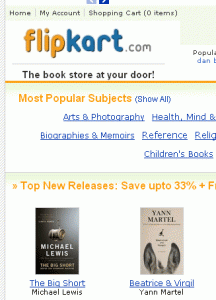Flipkart.com – Read India Read !
While E-commerce in India has a long way to go before it can catch up with some of the western countries, it is surely growing by leaps and bounds. Leading bookstores like Landmark and Crossword have enabled buying books online, thereby catering to a very large market.
A relatively new player in the bookselling space in India, is flipkart.com. Flipkart was founded on 5th September, 2007 by two ambitious and talented young men, Sachin Bansal and Binny Bansal. Both of them are Computer Science graduates from the prestigious Indian Institute of Technology, Delhi, and love what they do with a tremendous passion. Having worked in Amazon India, their love for books coupled with their desire to start on their own soon took concrete shape as they quit and started flipkart.com in 2007. Having started with 50,000 titles, now the number of titles that are available has doubled. What has struck me the most about flipkart.com, is their fantastic service, in terms of delivery time. I have received books a couple of days ahead of schedule, even. Their range of books is also quite commendable.
Having interacted with a couple of members from the flipkart team, here’s an interview: (Inputs from Sachin Bansal, CEO and Co-founder, Flipkart)
What are the challenges you face as a purely online 24*7 bookstore?
[Flipkart team] Initially when we started out, it wasn’t easy for us to earn the trust of the customer. Our quality of customer service, coupled with the fact that books could be bought at a low transaction size, helped us get trials and gain the trust of customers.
Handling customer complaints, without having a ‘face’ to our customer service proves to be bit of a challenge at times. Not having the ‘display’ advantage, the ‘browsing’ feature and not being able to carry out promotional activities are some other obvious challenges.
The discomfort of paying by cards, on account of security fears is another challenge. We have now tried to address that by introducing the ‘cash-on-delivery’ option.
The fact that highest number of orders and sales get registered during weekends proves to be tough at times for logistics and customer service. The fact that we have to work 24 / 7 and the customer perceptions around it also bring some difficulty (For example, the customer places an order at 12 am and counts the number of hours for delivery right from then!)
In spite of al these challenges (however big or small) we still enjoy and prefer working on the online model because of all its plus points.
Do you think people take one more seriously when one is a bookstore with a physical presence, and then launches into the online business as opposed to a model like yours? (In terms of apprehensions, concerns)
No, it is quite different as we feel that across the world and across business categories, the leaders in the online and offline segments are different. And the largest name in the e-commerce segment, Amazon.com, is an example of this. Customers also view the online business differently from that of the offline business. Therefore there is no advantage for an online store to have an offline presence.
In fact, being a leading offline player can prove to have some disadvantages as people could perceive them as not having expertise in the online model. What is required to run an offline business successfully is very different from what is required to run an online business successfully, whether it is a book store or any other category.
One of the many positive things we keep hearing about Flipkart, is the fantastic range of books that you source. What challenges do you face when you need source books from different countries?
International distributors are far more transparent and easier to work with than Indian distributors. The Indian ecosystem is only beginning to mature and may take time to reach international standards. Yet, our effort is to constantly reach new international distributors so we can provide what our customers desire.

